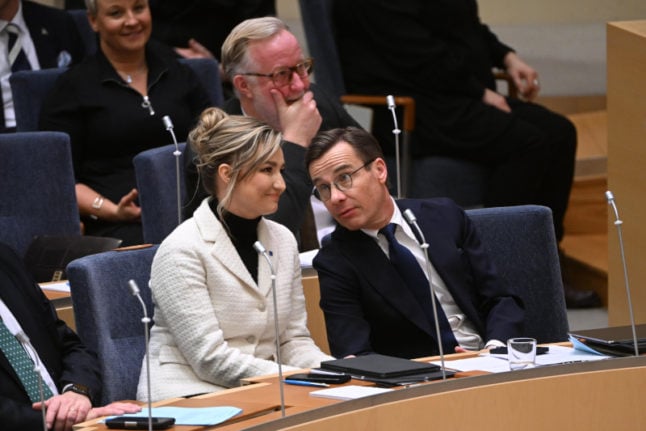In our weekly Politics in Sweden column, The Local’s editor Emma Löfgren explains the key events to keep an eye on in Swedish politics this week.
A few times every year (there are another two scheduled for 2023), the leaders of Sweden’s eight parties go head to head in a debate in the parliament chamber.
Sweden isn’t like, for example, the UK where the leaders of the two main parties face off every week to the backdrop of thunderous applause and cries of “shame” from fellow parliamentarians. It’s a much more subdued affair, as you may expect.
But that doesn’t mean it isn’t significant – and it sometimes even gets exciting.
The first one of the year was held last week. Here are the key points:
Prime Minister Ulf Kristersson, leader of the conservative Moderate party, who’s been joined in coalition by the Christian Democrats and Liberals since the last election, propped up by the Sweden Democrats in parliament, tried to bring gravitas to his new role as PM.
He reached out across the political divide to court support from the opposition for more collaboration.
“If we can’t agree on everything, perhaps we can agree on some things,” he said, picturing further conversations around migration, energy, and law and order.
“On the precondition that Sweden must have a strict migration policy for a long time to come,” he added, so readers should not get your hopes up for more leniency on this.
READ ALSO: What’s the current status of Sweden’s planned migration laws?
Social Democrat opposition leader Magdalena Andersson, former prime minister and finance minister, continued to attack the government on broken election pledges – including delayed energy subsidies and fuel prices that continue to rise at the pump.
“Handling people’s economy like that isn’t respectful,” she said, and Left Party leader Nooshi Dadgostar slammed Europe’s “stingiest and slowest energy compensation”.
Jimmie Åkesson, leader of the far-right Sweden Democrats, said the imminent “paradigm shift” in migration politics would be “of direct decisive importance for our future”, which may well be true.
He said past migration policies had torn Sweden apart, although one could argue that there’s little prospect of that changing any time soon.
Despite the debate being far less along the lines of collaboration than Kristersson envisaged in his comments, all angry words were seemingly forgotten when the party leaders bid farewell to Centre Party leader Annie Lööf, who’s quitting after 11 years.
Whenever a party leader steps down, fellow party leaders give speeches in their honour and hand out gifts to them in parliament, and last week was no different.
The Local’s Nordic editor Richard Orange wrote about Lööf’s presents in this article.
In other news
Kristersson condemned as “deeply disrespectful” the burning of a Koran in Stockholm (by far-right extremist Rasmus Paludan) this weekend, an incident which raised tensions with Turkey as Sweden courts a reluctant Ankara over its application to join Nato.
A slippery story is causing friction in Sweden, after Kristersson’s closest aide got caught illegally fishing for eel back in 2021, then twice lying to authorities about it. The opposition has been calling for his resignation ever since he admitted to the crime.
When political aides were not out poaching endangered species, small positive climate steps were made as a new report by the Swedish Environmental Protection Agency shows that Sweden has reached one of its environmental targets – A Protective Ozone Layer – and that “it may now be possible to fully or partially reach the Clean Air, A Non-Toxic Environment and A Safe Radiation Environment objectives by 2030”. The remaining 12 objectives are not expected to be met by 2030.
In the report, the agency calls on politicians to prioritise climate and biodiversity in the years ahead. “Among other things, financial market actors need to be provided with better conditions to enable them to contribute to the environmental objectives,” it writes.
You can read the report here – there’s an English summary on pages 10-11.
What’s next?
The EU’s justice, home affairs and migration ministers are set to head to Stockholm for an informal meeting this week, as part of Sweden’s six-month EU Council presidency.
The first two weeks of February will likely be more interesting than this week, by the way, with Lööf’s successor set to be elected and the Swedish Central Bank to announce its latest decision on the interest rate – will they leave it unchanged, raise it or lower it?
Politics in Sweden is a weekly column by Editor Emma Löfgren looking at the big talking points and issues in Swedish politics. Members of The Local Sweden can sign up to receive an email alert when the column is published. Just click on this “newsletters” option or visit the menu bar.


 Please whitelist us to continue reading.
Please whitelist us to continue reading.
Member comments